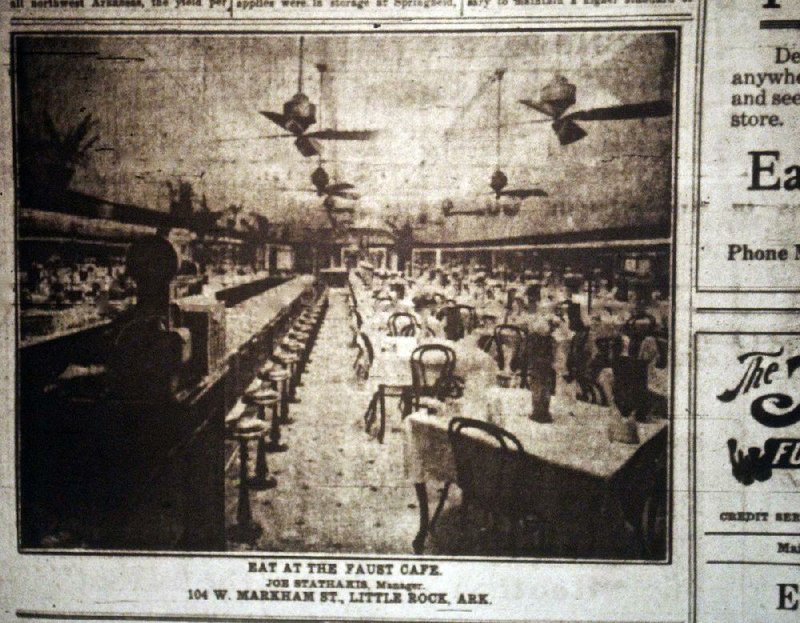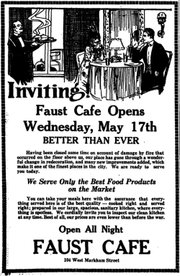In 1930, one George L. Stathakis of Buffalo, N.Y., tucked himself into a mattress-padded barrel and set off to conquer Niagara Falls. A philosopher and author, he had promised reporters that a turtle he was clutching, Sonny Boy, would tell his story were he to die. He was wrong.
Stathakis should sound like a familiar name, Dear Reader, because this is part four in a five-part series of Old News columns about a Greek immigrant named Joe Stathakis who lived in Little Rock 100 years ago.
Based on what we've already learned about Joe from (many) newspaper reports, we can imagine he was appalled -- appalled that the unfortunate daredevil was named Stathakis. Appalled that he was Greek. Appalled that he was mocked in the national news.
Stathakis was a common name in the Peloponnese region of southern Greece where Joe and his siblings were born. Some stories say Gythion was their hometown, others cite nearby Asopos.
Best as I can determine from census records and newspaper accounts, Joe's brothers in Little Rock were Pete and Sam; and they did have a brother George, but in Pennsylvania. That George didn't die until 1954, after a lingering illness, during a visit to Greece. They also had a sister, Despina, who didn't come to this country until 1949.
With exuberance and effort, these men built new lives in the restaurant business. We've seen how in 1912 Joe and Sam opened the Faust Cafe, a nice place with white tablecloths, flowers, a five-piece band, mahogany and marble. Sometimes they had a singing waiter.
They renovated that cafe and opened a coffeehouse and bakery between 1915 and 1918, while soldiers were flooding into town for training — first at Fort Roots for the Mexican border campaign and then at Camp Pike. The construction of the camp during World War I padded pockets all around, so there were plenty of customers eating at Joe's.
Also, he got a contract to feed soldiers for 25 cents a meal.
But a collapse was coming — first a milk shortage, then labor strikes; the cost of commodities jumped, and eventually basics like sugar were rationed.
The Jan. 3, 1918, Arkansas Gazette reported that after a long series of experiments, Joe had figured out how to make decent pastry using something called "war flour":
"War pastry" was a feature of "meatless Wednesday" at both of Mr. Stathakis' restaurants yesterday.
After the troops shipped out for Europe, customers were in short supply, too. April 12, 1918, the Arkansas Democrat reported:
The jury was unable to agree in the case of Gus M. Gans and others against Joe Stathakis and others, tried in the Second division circuit court Thursday. The judgment sought in the case was $1,900, which the plaintiffs alleged was due under a lease. According to the testimony of Mr. Stathakis, he paid $250 per month for the rent of the building occupied by the Faust Cafe, and that following his complaint to the [plaintiff] that because business was growing dull he could not afford to pay more than $150 per month, the plaintiff had told him that the price would be satisfactory, which amount he had paid monthly. It was denied by the plaintiffs that any such agreement had been made and they asked for the balance, $100 for nineteen months.
In July 1918, the state Supreme Court ruled in Joe's favor in a different case, his suit against the union of waiters and cooks that had picketed his shops in September (see Old News from Sept. 4). But refusing to hire union workers made it hard to find experienced help.
Aug. 16, 1918, the Gazette reported that Grover T. Owens, Pulaski County food administrator, had shuttered the Faust Coffee House and the bakery. A "secret service representative" and a state food inspector had found too much sugar at the coffeehouse. And there were weevils in the flour.
"It's all right. If I have violated the food regulations, I am willing to take my medicine," said Mr. Stathakis last night. "I want to make it plain, however, that if I have violated the regulations, it was because of lack of information."
Joe told the Gazette he'd relied on advice from his sugar supplier that it would be OK to take his ration for August even though he hadn't used up his July allotment. And he didn't realize the new load had been delivered when inspectors asked how much he had.
"As to the report of weevils being in the flour, I cannot explain this until I see my head baker. The flour was bought only this week, so I cannot be held responsible unless the men working in the bakery have not taken proper care of the flour bins. I have been very busy and have devoted little time to the bakery, but I had issued instructions that everything be kept in a sanitary condition."
Owens didn't buy it. After the Aug. 17 hearing, the Democrat reported that Owens ordered Faust Coffee House to close from 6 p.m. Thursday to 4 p.m. Saturday for hoarding 2,000 pounds of sugar. And because of the weevils, a red card had been placed in the bakery window.
While such a card represents the third class rating by health officials, it does not prohibit men in uniform from patronizing the bakery.
But that wasn't the end. In February 1919, Joe bought a new car, a seven-passenger Chandler.
In November, he opened Black Hawk Sales Co. at 511 Louisiana St., and his traveling salesmen hit the road, repping the Black Hawk gasoline saver. Attached to the manifold of a Ford, this device was supposed to increase the air-to-fuel ratio when the car was going at high speeds.
In May 1920, his car was stolen.
...
In September 1920, the Gazette chuckled when Joe razzed some baseball players from Texas:
The cafe was crowded, the help was short and "Mister Joe," perspiration pouring off his chubby face, was obliged to jump in and act as a waiter.
"Pretty tough to make a fat guy work so hard," commented one of the athletes as the proprietor went past staggering under a load of dishes.
"Sure is," agreed "Mister Joe" cheerfully, "and you guys are to blame for it."
"How come?" queried one of the athletes.
"Why, all my waiters won so much money on Little Rock today that none of 'em would work tonight."
...
In December 1920 with World War I in the rearview mirror, the Democrat asked Joe when he planned to lower his price for a cup of coffee to the prewar 5 cents.
And now to the high cost of eggs, the high cost of "overhead," the falling off of patronage, Joe Stathakis ... insists that with the high cost of dishes it makes no difference how low coffee gets, or sugar or cream, he will have to continue to sell coffee at 10 cents a cup.
"I can show you bills where already this year I have paid out right at $4,000 to replace dishes that have been broken in the restaurant," Stathakis said.
The skeptical reporter depicted Joe as only pretending to search for proof in an overwhelming pile of bills. And so "to save everybody trouble," the reporter looked up the price of china, per item.
With $4,000, and even at retail prices the reporter found that he could buy a right sizable pile of restaurant china. By investing the money in cups he found he would have 32,000 cups. With that many cups on hand the dishwasher could break 87 cups a day for 365 days and he would still have something like a barrel of cups left on hand. With the money invested in plates he would have a stock of only 8,000 plates in the beginning which would only give the dishwasher 21.9 plates a day to break ...
But with his $4,000 invested in butter chips he could give Charlie Chaplin a job as dishwasher, stage a wrecking scene every day and still have a few thousand butter chips left on which to serve the oleo on New Year's Day.
Ouch.
In January 1921, Joe's car was stolen again, and in July, someone stole the clothes off his clothesline.
March 13, 1922, the Gazette reported that a fire in a vacant rooming house above Faust Cafe was extinguished before flames took the roof. But the cafe suffered serious water damage.
It didn't reopen until May 17. The ad inviting the public back proclaimed: "You can take your meals here with the assurance that everything served here is of the best quality — cooked right and served right; prepared in our large, spacious, sanitary kitchen, where everything is spotless. We cordially invite you to inspect our clean kitchen at any time. Best of all our prices are even lower than before the war."
But it failed.
In April 1923, Joe filed for bankruptcy protection. His liabilities were about $19,800, and his assets were $19,500.


